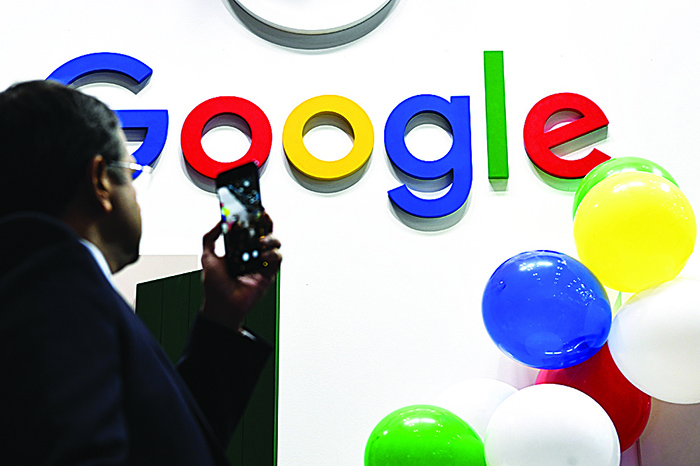 PARIS: A man takes a picture with his mobile phone of the logo of the US multinational technology and Internet-related services company Google as he visits the Vivatech startups and innovation fair, in Paris. —AFP
PARIS: A man takes a picture with his mobile phone of the logo of the US multinational technology and Internet-related services company Google as he visits the Vivatech startups and innovation fair, in Paris. —AFP
PARIS: Google yesterday said it is appealing a decision by France’s competition watchdog to hand it a 500-million-euro ($590 million) fine in a row with news outlets over the use of their content under EU copyright rules. “We disagree with some of the legal elements, and consider the amount of the fine to be disproportionate compared to the efforts we have put in place to reach a deal and respect the new law,” Sebastien Missoffe, head of Google France, said in a statement.
The fine, issued by the French Competition Authority in July, was the biggest in the agency’s history for a failure to comply with one of its rulings. The watchdog said Google had failed to negotiate “in good faith” with media companies in a long-running legal battle over the internet giant’s use of snippets of articles, photos and videos in search results.
The row has centered on claims that Google has used this content in its search results without adequate compensation, despite the seismic shift of global advertising revenues towards the search giant over the past two decades. In April last year, the French competition authority ordered Google to negotiate “in good faith” with media groups after it refused to comply with a 2019 European Union law governing digital copyright.
The so-called “neighboring rights” aim to ensure that news publishers are compensated when their work is shown on websites, search engines and social media platforms. Last September, French news publishers including Agence France-Presse (AFP) filed a complaint with regulators, saying Google was refusing to move forward on paying to display content in web searches.
While Google insists it has made progress, the French regulator said the company’s behavior “indicates a deliberate, elaborate and systematic lack of respect” for its order to negotiate in good faith.
The Competition Authority rebuked Google for failing to “have a specific discussion” with media companies about neighboring rights during negotiations over its Google Showcase news service, which launched late last year. Missoffe insisted yesterday that Google “recognizes neighboring rights, and we remain committed to signing agreements in France”. “We have extended our offers to nearly 1,200 publishers and modified aspects of our contracts,” he said, adding that the company has “shared data demanded of us in order to conform to the Competition Authority’s decision”.
Remote work option
Google on Tuesday extended the option for its employees to work from home into next year due to the pandemic. Returning to Google campuses will remain voluntary globally through January 10, with local offices given the discretion to decide when to require employees to return to their desks, according chief executive Sundar Pichai. “I’m happy to say that a large number of offices globally are already open for business, and we are welcoming back tens of thousands of Googlers on a voluntary basis,” Pichai said. “The road ahead may be a little longer and bumpier than we hoped, yet I remain optimistic that we will get through it together.”
He promised Google workers 30 days’ notice before they would have to return to their offices, and announced they would be able to take off an extra day in October and December as “reset days” to “rest and recharge.” Google, Facebook and other tech giants have delayed plans for workers to return to the campuses that were abandoned early in the pandemic in an effort to limit the spread of COVID-19. Tech firms have also instituted vaccine and mask requirements to make offices safer as the Delta variant surges in the US and other countries. —AFP
.jpg)
